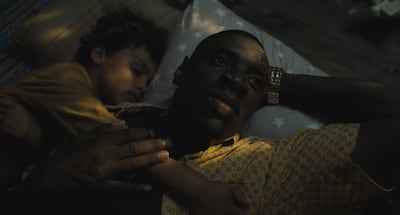This past year has seen filmmakers defiantly tackle the global refugee crisis.
Matteo Garrone’s Oscar-nominated Io Capitano traced the journey of Senegalese teenagers to Italy, while Agnieszka Holland’s Green Border looked at Syrian refugees brutally treated as they cross from Belarus into Poland.
Now, American producer-turned-director Brandt Andersen adds to this collection with The Strangers’ Case, an ensemble drama that has a surprisingly effective jigsaw-like structure and some strong performances, particularly from Omar Sy.
Shot in Jordan and Turkey, this fully Jordanian production – which will have a special screening at this year’s Berlin International Film Festival – opens with a fitting quote from the Elizabethan play Sir Thomas More, thought to be co-written by William Shakespeare.
It references our “mounting inhumanity” to the displaced: “This is the strangers’ case.” When the film truly starts, after a brief Chicago-set sequence that bookends the film, we are in Aleppo.
Amira (Yasmine Al Massri) is a doctor coming off a 72-hour shift, her scrubs covered in blood when an injured soldier lying on the table draws a gun on an also wounded rebel.
It’s the first violent act in a film full of them, where characters are forced to face or flee the ravages of war. Within minutes, we are back with Amira, where her birthday celebrations are under way when a huge explosion causes devastation to her building.

Soon we switch to a soldier, Mustafa (Yahya Mahayni), who believes his father (hailed as a hero in some quarters) has sided with the rebels. “My son is dead,” spits the elderly man, seemingly disgusted at what he perceives his child has become. In fact, Mustafa is deeply conflicted, asking a fellow soldier who shot a boy to death: “Did you feel nothing?”
A story of fathers and sons, mothers and daughters, the chapter-like structure keeps returning to incidents from other perspectives to give us further insight into events.
The obvious forebear is Pulp Fiction, which revitalised the crime saga using this method. Andersen manages the same for the refugee drama, as characters cross over into other parts of the tapestry, especially when the story moves on a month. Here, in Turkey, we meet Marwan (Sy) in a chapter titled The Smuggler.
As tender a father as you could wish to see, Marwan has plans to escape to Chicago with his boy. But at work, he’s as ruthless as they come. Brandishing a pistol and an enormous tattoo on his back, Marwan organises boat crossings for those wishing to make it to Greece.
A cash-only operation, he has no interest in whether his charges survive. “They make, they don’t … it all pays the same,” he says. Hanging from his car mirror, in a nice detail, is a jewelled dollar sign – proof that money is his guide.
Sy’s muscular performance drives this section and, along with Al Massri, remains the standout part of the film. Does the story add anything to the refugee stories we’ve seen of late? Twisting on heartbreak, horror, and humanity … arguably it doesn’t.
But styling the film almost like a thriller, especially with its tricksy structure, does grab the attention. Running for 96 minutes too keeps it brisk. Perhaps only the final segment, which involves the Greek authorities, feels superfluous.
Adapted from Andersen’s own short Refugee (2020), the film comes complete with an impressive ability to imitate Hollywood production values where needed, whether it's bombed-out buildings or boat rescues.
While the film may suffer from audience fatigue, following the likes of Io Capitano, that doesn’t take away from what a powerful and engaging drama this is. Laying bare the plight of the refugees, it shows how we need to ensure to keep our doors open to strangers.

